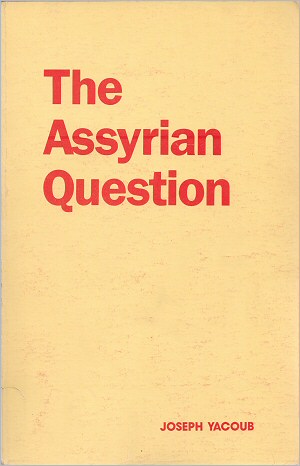|
|
Joseph Yacoub, Ph.D.
Posted: Wednesday, August 18, 2010 at 03:50 PM UT | Updated: February 06, 2025
| Dr. Joseph Yacoub interviewed by host, Wilson Yonan, on ANB SAT television. |
 |
FROM THE BOOK:
The Assyrian Question
Introduction
Dr. Joseph Yacoub, Professor of Political Sciences at the Catholic University of Lyon, France, was born in Hassakeh, Syria and grew up in Beirut, Lebanon where he received both his Bachelor's and Master's degrees in Sociology.
In 1969, he moved to Lyon to pursue doctoral studies, received his Doctor's degree in history and went on to develop his academic research in what he has achieved: a thesis of “State Doctorate” in Letters and Historical Sciences at the Catholic University of Lyon.
This thesis, submitted on January 18, 1985 and entitled: “The Assyro-Chaldean Question — The Western Powers and the League of Nations, from 1908-1938,” enables him from now on to become “Maître de Conférences” (that is, in France, the highest academic degree to be recognized after the Ph.D.).
Dr. Yacoub's parents were among the Assyrians who escaped the Massacre of Salamas and Urmia in 1915. His father, Lieutenant Bablo, was a member of the Assyro-Chaldean Battalion in Jaziereh, Syria.
For years, Dr. Yacoub was concerned with the minorities, the oppressed and the stateless peoples. In the late 1970's, this very concern led him to ask himself questions and reflect on his people. He commenced an independent work of extensive scientific investigation, to bring to light the contemporary history of the Assyrians, thus, revive a nation so little known and until today largely disregarded by history.
 |
||||
|
||||
— Léna Rayes
Freelance journalist
Preface
In this pioneering investigation, Joseph Yacoub, Ph.D., engages in combat to revive the recent history of the Assyrian people - a nation which suffered severe persecution under the Ottoman Empire and Persia for centuries.
The pages ahead offer both facts and comments, analyzing the situation of the Assyrians in the context of world War I and politico-diplomatic movements (Paris Peace Conference, Treaty of Sèvres, Treaty of Lausanne, League of Nation's activities0, beginning with the massacres of 1914-18, including the ones perpetrated by the Iraqi government in August 1933, to their present crucial situation.
Yet more importantly, the author's main purpose is to reopen the Assyrian Question before the International Organizations (United Nations, Council of Europe, European Parliament) for the recognition of genocide committed against the Assyrians, and, attempts to lead his compatriots toward preliminary actions to recover their despoiled national rights.
In addition, he provides the reader with a stimulating explanation regarding the Assyrian Genocide by assembling much of the best testimony — unearthed until today — and intends to remind the civilized world of the extent the Assyrian people have suffered during the period covered in the book, and how easily the whole tragedy has been forgotten.
Much of the evidence herein has been collected during the past decade by extensive research and in-depth studies of books, manuscripts and interviews, along with a plethora of information extracted from a multitude of diplomatic archives and documents.
This book is undoubtedly a great and unique achievement for the author, guiding the reader as it does, through the “Assyrian Labyrinth.”
— Léna Rayes
Freelance journalist
About the author
 Joseph Yacoub, Ph.D., who teaches Political Sciences at Lyon's Catholic University in France, is a major voice on the Assyrian Question throughout Europe and the United States. The author of a 4-volume thesis on the Assyrian case — the first to be ever published in France, Yacoub devotes much of his time writing, lecturing, and acting on the Assyrian Question and other topics of related interests. | writings
Joseph Yacoub, Ph.D., who teaches Political Sciences at Lyon's Catholic University in France, is a major voice on the Assyrian Question throughout Europe and the United States. The author of a 4-volume thesis on the Assyrian case — the first to be ever published in France, Yacoub devotes much of his time writing, lecturing, and acting on the Assyrian Question and other topics of related interests. | writings
| UNESCO Chair in Memory, Cultures and Interculturality | Chaire UNESCO - France. |